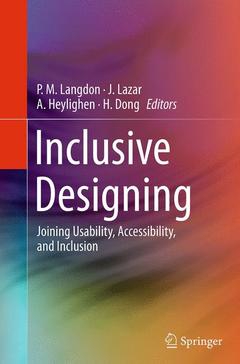Inclusive Designing, 2014 Joining Usability, Accessibility, and Inclusion
Coordonnateurs : Langdon P. M., Lazar J., Heylighen A., Dong H.

Preface.- Part I Measuring Product Demand and Peoples' Capabilities.- An HCI Survey on Elderly Users in India.- User Capabilities vs. Device Task Demands in a Tape Dispenser Product for Persons with Limited Dexterity.- Part II Designing Cognitive Interaction with Emerging Technologies.- Three Scanning Methods for Text Cursor Manipulation.- A Combinatory Approach to Assessing User Performance of Digital Interfaces.- How Interface Adaptation for Physical Impairment Can Help Able Bodied Users in Situational Impairment.- Gender Issues in ICT Adoption: A Literature Review.- Blind and Deaf Consumer Preferences for Android and iOS Smartphones.
Dr Patrick Langdon is an experimental psychologist who has contributed to cognitive science, artificial intelligence, robotics and psychophysics. Now at the Cambridge University Engineering Design Centre his most recent research has been in Inclusive User Centred Design, interaction design, prior experience, and multimodal interface profiling from cognitive modelling. Dr Langdon was primary author and co-investigator of the successful EPSRC EQUAL “i~design 3” consortium project; “Extending Active Living Through More Effective Inclusive Design” (2006-2011), which he also managed. He was invited to join phase 2 of the (EPSRC/DST) India-UK Advanced Technology Centre, a centre of excellence for next generation network systems and services, where, with a team of recruited research associates he has built on recent success developing UI technology to support adaptive user interfaces that are accessible to the wider range of users, having impact in both the UK and India. Pat Langdon is the Author and Co-PI of five new EPSRC and Industry funded projects, all concerned with user centred design for new Human Machine Interfaces, in the application areas of Automotive, Aerospace and wireless communications in emergencies.
Jonathan Lazar is a professor of computer and information sciences, director of the undergraduate program in information systems, and founder and director of the Universal Usability Laboratory, all at Towson University. His research focuses on understanding how people with disabilities interact with technologies, how improved interface design can change the quality of life for people with disabilities, and how human-computer interaction and public policy influence each other. During the 2012-2013 academic year, Dr. Lazar was the Shutzer Fellow at the Radcliffe Institute for Advanced Study at Harvard University, researching the relationship between web-based interfaces that are inaccessible to people with disabilities, and how those in
Proceedings of CWUAAT '14; a unique multi-disciplinary workshop that represents the Inclusive Design Research community
Provides a platform for a multidisciplinary approach that reconciles the diverse and sometimes conflicting demands of Design for Ageing and Impairment, Usability and Accessibility and Universal Access
Develops methods, technologies, tools and guidance that support product designers and architects to design for the widest possible population
Includes supplementary material: sn.pub/extras
Date de parution : 09-2016
Ouvrage de 282 p.
15.5x23.5 cm
Date de parution : 03-2014
Ouvrage de 282 p.
15.5x23.5 cm



